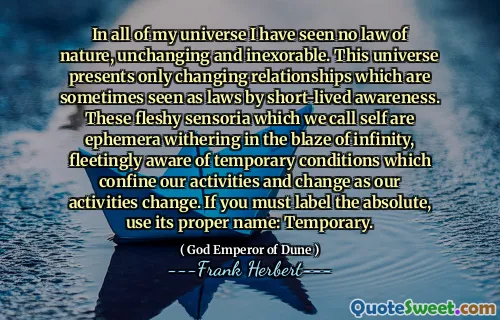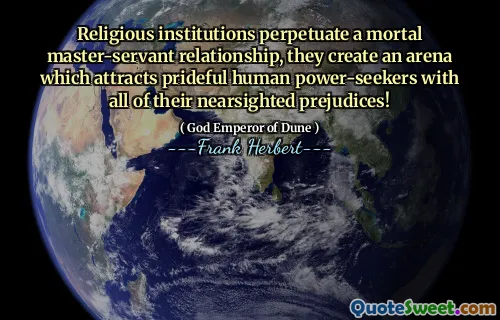
Religious institutions perpetuate a mortal master-servant relationship, they create an arena which attracts prideful human power-seekers with all of their nearsighted prejudices!
Frank Herbert's observation in '(God Emperor of Dune)' challenges us to consider the role of religious establishments beyond their spiritual dimensions. He suggests that organized religion often fosters a hierarchical dynamic between leaders and followers, effectively creating master-servant relationships. This dynamic can lead to an environment where human ambition and pride are amplified under the guise of spiritual authority. Such structures may inadvertently suppress individual critical thinking, encouraging dependence on authority figures rather than personal enlightenment. Herbert's critique encourages us to reflect on how institutions—religious or otherwise—can sometimes prioritize power and control over genuine spiritual growth, often attracting individuals motivated by ego or the desire for authority. These systems can become arenas where prejudice, dogma, and social stratification thrive, instead of promoting equality and understanding. Recognizing this tendency is vital for introspection within any organized belief system; it prompts us to question the true purpose of our spiritual communities and to seek personal authenticity rather than surrendering to hierarchical dependencies. Meaningful spiritual growth might then involve cultivating personal insight and fostering humility, rather than submitting to institutional authority that may be rooted in human flaws like pride and narrow-mindedness. Herbert's insight remains provocative and relevant, urging us to examine how our affiliations with religious institutions shape our perceptions of morality, power, and community. Truly understanding this dynamic can empower individuals to pursue spiritual paths that encourage equality, insight, and genuine freedom from oppressive structures.







